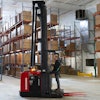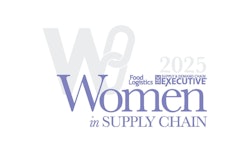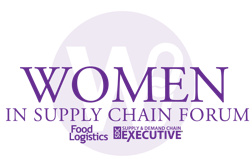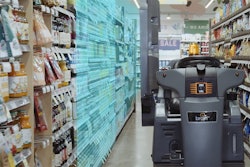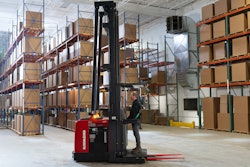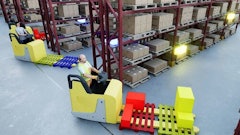
Kalene Lee, national transportation manager for UNFI, was named a recipient of the 2025 Women in Supply Chain award, presented by Food Logistics and Supply & Demand Chain Executive, and sponsored by Let’s Talk Supply Chain, in the Rising Stars category.
Lee is a results-driven supply chain leader with over 16 years of experience improving operations and leading teams in the consumer packaged goods and retail industries. At UNFI Canada, she serves as manager, national transportation analytics and reporting, where she supports teams across the country with data-driven insights to improve delivery performance, reduce costs, and solve logistics challenges. Lee has helped implement national systems like Roadnet and Peoplenet, automated processes to drive savings, and partnered across departments to align efforts and deliver results. She’s also led Lean Six Sigma projects, mentored large teams, and worked to create more efficient and engaged workplaces.
One of her greatest achievements entail the GE/GC transportation improvement project, where she evaluates and improves processes to improve customer on-time delivery and bottom-line results, resulting in $300,000 in unbudgeted savings. Another accomplishment was the GW freight cost review, where she worked with the U.S. freight team to reroute and review GW freight, resulting in a 3% reduction of cost of total inhouse trucking fleet.
Marina Mayer, editor-in-chief of Food Logistics and Supply & Demand Chain Executive and co-founder of the Women in Supply Chain Forum, sat down with Lee to discuss her journey, UNFI's GE/GC transportation improvement project and why it's important to never underestimate the power of relationships.
Food Logistics and Supply & Demand Chain Executive: Let’s first talk about you. Tell us about yourself and your journey and how you got to this current stage in your career.
Kalene Lee: My early experience as an operations management trainee gave me a strong appreciation for the fast pace and complexity of supply chain operations. After being promoted to manage a distribution center, I deepened my understanding of logistics, and team leadership in driving customer satisfaction and cost efficiency. To broaden my experience, I moved into the manufacturing side of the business, gaining exposure to end-to-end supply chain functions and developing a more strategic approach to problem solving.
Today, I serve as manager, national transportation analytics and reporting at UNFI Canada, where I support teams across the country with data-driven insights to improve delivery performance, reduce costs, and solve complex logistics challenges.
What’s guided me throughout my career is a passion for bringing people and ideas together to solve problems that matter. I learn the most by staying curious, being open to different perspectives, and working alongside others to navigate challenges. For me, leadership is about practical solutions, clear communication, and helping others succeed, whether that’s in the warehouse, on the plant floor, or through national transportation strategy.
Food Logistics and Supply & Demand Chain Executive: Walk me through some of the challenges you personally have faced in the industry, and what you did to turn those challenges into opportunities.
Lee: One of the challenges in supply chain is just how quickly things can change. It’s a fast-paced environment where things can evolve in the blink of an eye. Staying organized, calm, and a few steps ahead can be helpful when situations arise.
I remember in 2021 when heavy rainfall caused major flooding in British Columbia led to the closure of key highways and rail lines. As a result, hundreds of shipments, and customers were significantly impacted. By leveraging my experience and knowledge in supply chain management, I worked tirelessly with my team during the month-long disruption. In the end, we were able to minimize the overall impact and maintain the trust of customers.
That experience reinforced my belief that challenges like these are opportunities to lead, not just in terms of logistics, but through communication, teamwork, and being solution-focused, even when the path forward isn’t clear.
Food Logistics and Supply & Demand Chain Executive: One of your greatest achievements as outlined in your nomination form entails the GE/GC transportation improvement project. What does this entail? What makes it your greatest achievement?
Lee: The GE/GC transportation improvement project focused on one of our highest-volume and operationally complex regions in Canada. As with many growing divisions, their transportation network evolved over time to meet changing demands, customer expectations, and unique regional challenges. As a result, the processes had naturally become more complex, and with that complexity came opportunities to review and refine.
My involvement brought in a fresh perspective. I took the time to understand the current state, not just by looking at data, but by asking thoughtful questions and listening carefully to the teams involved. I was curious about how things had developed and looked for areas where we could simplify, consolidate, or improve without disrupting service.
Through that process, I identified opportunities to streamline our rate structures, align carriers more efficiently, and reduce overlapping costs. One of the most impactful outcomes was a rate consolidation strategy that delivered $540,000 in annual savings.
This experience demonstrated the power of curiosity, collaboration, and strategic thinking. It wasn’t about fixing something that was broken but building on a strong foundation and unlocking even greater value for the business and our customers.
Food Logistics and Supply & Demand Chain Executive: You’ve spent the last 16 years improving operations and leading teams in the CPG and retail industries. What advice do you have for those just entering the supply chain space?
Lee: My biggest advice is to stay curious, be consistent, and take the time to understand how the different parts of the business work together. Supply chain is incredibly dynamic and interconnected, and progress often comes from asking thoughtful questions and approaching challenges with energy and a willingness to learn.
For women entering the field, especially in environments that are still male-dominated, it can sometimes feel intimidating. Know that your perspective is valuable, and your voice matters. Confidence builds with experience, so give yourself the grace to learn, and lean on people around who support your growth.
Finally, never underestimate the power of relationships, success in supply chain is built on collaboration. Be someone others can rely on, and someone who listens, and you’ll build the kind of trust that drives real impact.
Food Logistics and Supply & Demand Chain Executive: What are your Top 3 predictions/trends for supply chain and logistics come 2026?
Lee: AI will drive smarter, real-time transportation decisions
AI and advanced analytics will become essential tools in supply chain and logistics, especially for optimizing routes, managing disruptions, and improving delivery performance. Data-driven decision-making will be critical for staying agile and cost-effective.
Environmental sustainability and maximizing fuel efficiency
Environmental sustainability will continue to be a top priority, with a strong push toward lower-emission transportation options, smarter route planning to reduce fuel use, and investment in alternative fuels and electric fleets.
Data integration and connectivity to boost efficiency
Integration of data across all supply chain systems drive improved visibility and real-time insights. This automated connectivity will help reduce error, enabling faster decision-making and smoother coordination between suppliers, logistics providers, and customers. The outcome will be a supply chain that operates with greater speed, flexibility, and robustness.



